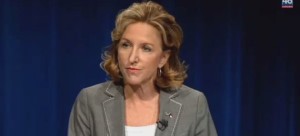Internet fact checks contributed to Dems defeat, pundit says

By Paul Chesser | Special to Watchdog.org
KEEP IT BRIEF: Sen. Hagan reportedly skipped a classified briefing to raise money.
A major reason for U.S. Sen. Kay Hagan’s loss — and the defeats of most legislative candidates down the ballot — lies in one simple concept.
Telling the truth.
It’s been three weeks since Election Day and Democrats in North Carolina have mulled and analyzed the reasons for their failures — from the drag on the ticket by President Obama to Republican gerrymandering to events beyond their control such as ISIS and Ebola.
But now we know.
On Monday, former Democrat political consultant and current communications adviser Thomas Mills authored the frank assessment in a post on his PoliticsNC blog. While both before and after Nov. 5 nearly all media coverage and analysis focused on money spent on television ads in the Senate race between Hagan and Republican Thom Tillis, Mills believes many — if not most — voters looked elsewhere to find accurate information about the candidates. He sees a trend in which citizens don’t just accept what they’re spoon-fed in relentless, contradictory TV ads, but they instead explore for themselves candidates’ positions are on the issues.
In other words, they are “Googling” and finding the various media “fact-checks” about the ads to find the truth.
“This theory jibes with the changing manner in which people are gathering and consuming information,” Mills wrote. “In the Walmart Moms focus group in Charlotte in mid-October, a group of mainly undecided women voters knew very little about either Thom Tillis or Kay Hagan despite almost $100 million in ads. Several women said they would go online to learn more about the candidates before they voted.”
What voters discovered was that in advertisements for Hagan, and to a lesser extent Democrat legislative candidates — whether from their own campaigns or placed by outside groups — were either not fully telling the truth, or even outright lying in claims they made about Republican opposition.
Mills cited three examples that Republicans repeatedly refuted throughout the campaign season.
The first was the charge in a Hagan ad — often repeated by her, her supporters and independent groups who produced spots on her behalf — that Tillis, as speaker of the N.C. House, cut $500 million from the state’s education budget. That claim was found to be “mostly false” in a “Truth Check” by television station WYFF in Greenville, S.C., which also covers western North Carolina.
The Tampa Bay Times’ Politifact said the ad was “literally false,” but rated Hagan’s claim as “half true,” because Republicans allegedly didn’t increase education spending enough to maintain the status quo.
The second example cited by Mills was the allegation Republicans would allow Duke Energy to pass the costs of cleaning up the Dan River coal ash spill to its ratepayers instead of to its shareholders. WRAL in Raleigh determined an ad by NC Families First against state Sen. Chad Barefoot was false, and said another ad that targeted Tillis had problems, too.
The third Democrat campaign falsehood Mills said was a problem was the claim Republicans raised taxes on 80 percent of North Carolinians as they implemented reforms. That one was quickly and easily debunked as untrue by the Washington Post, FactCheck.org and WRAL.
Mills noted that while political ads may still be mostly delivered on television, the fact-checking about them has proliferated online, where they forever remain. That is a powerful, permanent resource for voters to research candidates — even more important than their own websites. And the Fourth Estate — journalism — has developed a powerful new means of holding politicians accountable about their words and deeds.
“In essence,” Mills wrote in his blog post, “Republicans believe that Democrats lost credibility with the voters, and the Internet — as much as the Republican counter ads — drove the point home.”
To be sure, the culpability for stretching the truth did not exclusively lie with the Democrats, as sites like Politifact and Factcheck.org archived statements and ads by Tillis that found, on occasion, his claims were “half true” or “mostly false.” The campaign watchdog sites found misrepresentations by Tillis about Hagan’s positions on carbon taxes and Obamacare, among other issues. But apparently those didn’t arise to the level of problematic by Mills, who solely focused on the veracity of his fellow Democrats’ claims.”







